
The president of France, officially the president of the French Republic, is the executive head of state of France, and the commander-in-chief of the French Armed Forces. As the presidency is the supreme magistracy of the country, the position is the highest office in France. The powers, functions and duties of prior presidential offices, in addition to their relation with the prime minister and government of France, have over time differed with the various constitutional documents since the Second Republic.

The prime minister of France, officially the prime minister of the French Republic, is the head of government of the French Republic and the leader of the Council of Ministers.

Nandamuri Taraka Rama Rao, often referred to by his initials NTR, was an Indian actor, filmmaker and politician who served as Chief Minister of Andhra Pradesh for seven years over three terms. He starred in over 300 films, predominantly in Telugu cinema, and was referred by the media as Viswa Vikhyatha Nata Sarvabhouma. Rao received three National Film Awards for co-producing Thodu Dongalu (1954) and Seetharama Kalyanam (1960) under National Art Theater, Madras, and for directing Varakatnam (1970). Known for his breakthrough performances in Raju Peda (1954) and Lava Kusa (1963), Rao garnered the Nandi Award for Best Actor for Kodalu Diddina Kapuram in 1970, and the Inaugural Filmfare Award for Best Actor – Telugu in 1972 for Badi Panthulu.

Haradanahalli Doddegowda Deve Gowda is an Indian politician who served as the 11th prime minister of India from 1 June 1996 to 21 April 1997. He was previously the 14th Chief Minister of Karnataka from 1994 to 1996. He presently is a Member of Parliament in the Rajya Sabha representing Karnataka. He is the national president of the Janata Dal (Secular) party. Born in a farming family, he joined the Indian National Congress party in 1953, and remained a member until 1962. He was imprisoned during the Emergency. He became President of the state unit of Janata Dal in 1994, and was considered to be a driving force in the party's victory in Karnataka. He served as the 8th Chief Minister of Karnataka from 1994 to 1996. In the 1996 general elections, no party won enough seats to form a government. When the United Front, a coalition of regional parties, formed the central government with the support of the Congress, Deve Gowda was unexpectedly chosen to head the government and was elected Prime Minister. During his tenure as prime minister, he also served as Home Minister for some time. His prime ministerial tenure lasted for less than a year. After his prime ministerial tenure, he was elected to the 12th (1998), 14th (2004), 15th, and 16th Lok Sabha, as Member of Parliament for the Hassan Lok Sabha constituency. He lost Lok Sabha elections in 2019 from Tumkuru but has been elected to Rajya Sabha since.

The World Assemblies of God (AG), officially the World Assemblies of God Fellowship, is an international Pentecostal denomination.
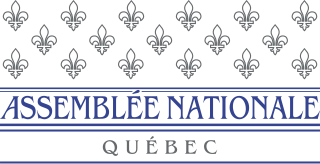
The National Assembly of Quebec is the legislative body of the province of Quebec in Canada. Legislators are called MNAs. The King in Right of Quebec, represented by the lieutenant governor of Quebec and the National Assembly compose the Legislature of Quebec, which operates in a fashion similar to those of other Westminster-style parliamentary systems. The assembly has 125 members elected first past the post from single-member districts.
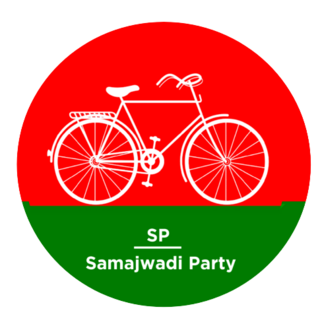
The Samajwadi Party is a socialist political party in India. It was founded by formerly Janata Dal politicians Mulayam Singh Yadav and Beni Prasad Verma and is headquartered in New Delhi. The Samajwadi Party is currently led by former Chief Minister of Uttar Pradesh, Akhilesh Yadav after he was chosen as the President at the party's national convention held in 2017.
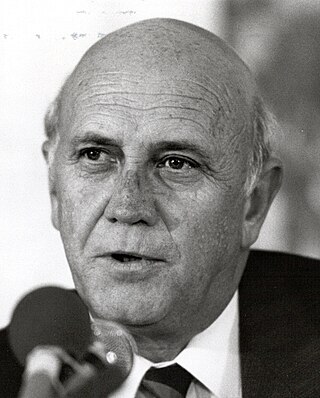
General elections were held in South Africa between 26 and 29 April 1994. The elections were the first in which citizens of all races were allowed to take part, and were therefore also the first held with universal suffrage. The election was conducted under the direction of the Independent Electoral Commission (IEC), and marked the culmination of the four-year process that ended apartheid.

The prime ministerof Vietnam, officially styled as the prime minister of the Government of the Socialist Republic, is the head of government of Vietnam who presides over the meetings of the Central Government. The prime minister directs the work of government members, and may propose deputy prime ministers to the National Assembly.

The prime minister of Pakistan is the head of government of the Islamic Republic of Pakistan. Executive authority is vested in the prime minister and his chosen cabinet, despite the president of Pakistan serving as the nominal head of executive. The prime minister is often the leader of the party or the coalition with a majority in the lower house of the Parliament of Pakistan, the National Assembly where he serves as Leader of the House. Prime minister holds office by virtue of their ability to command the confidence of the National Assembly. The prime minister is designated as the "Chief Executive of the Islamic Republic".

The National Assembly of Pakistan is the lower house of the bicameral Parliament of Pakistan, with the upper house being the Senate. As of 2023, the National Assembly has a maximum membership of 342, of which 266 are directly elected by an adult universal suffrage and a first-past-the-post system to represent their respective constituencies, while 70 are elected on reserved seats for women and religious minorities from all over the country and six on reserved seats for former Federally Administered Tribal Areas, and the members hold their seats for five years or until the house is dissolved by the President on the advice of the Prime Minister. The house convenes at the Parliament House, Red Zone, Islamabad.

The Parliament of Pakistan is the supreme legislative body of the Islamic Republic of Pakistan. It is a bicameral federal legislature, composed of the President of Pakistan and two houses: the Senate and the National Assembly. The president, as head of the legislature, has the power to summon or prorogue either house of the Parliament. The president can dissolve the National Assembly, only on the Prime Minister's advice.

During the French Revolution, the National Assembly, which existed from 17 June 1789 to 29 September 1791, was a revolutionary assembly of the Kingdom of France formed by the representatives of the Third Estate (commoners) of the Estates-General. Thereafter, it was known as the National Constituent Assembly, although the shorter form was favored.

The prime minister of Cambodia is the head of government of Cambodia. The prime minister is also the chairman of the Cabinet and leads the executive branch of the Royal Government of Cambodia. The prime minister is a member of parliament, and is appointed by the monarch for a term of five years. Since 1945, 37 individuals have served as prime minister; 33 as official prime ministers, and 4 in acting capacities. The current prime minister since 2023 is Hun Manet.

The National Assembly of the Socialist Republic of Vietnam is the national unicameral legislature of Vietnam.
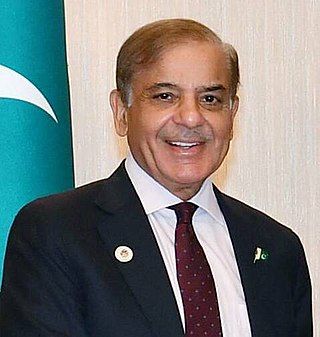
Mian Muhammad Shehbaz Sharif is a Pakistani politician and businessman who served as the 23rd prime minister of Pakistan, in office from April 2022 to August 2023. He is the current president of the Pakistan Muslim League (N) (PML-N). Previously in his political career, he served as the Chief Minister of Punjab three times, making him the longest-serving Chief Minister of Punjab.
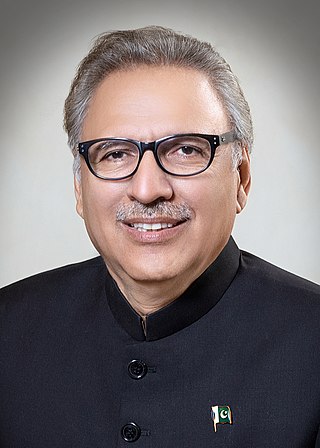
Dr. Arif-ur-Rehman Alvi is a Pakistani politician currently serving as the 13th President of Pakistan, in office since 9 September 2018. He was a member of the National Assembly of Pakistan from June 2013 to May 2018 and again from August to September 2018. A founding member of the Pakistan Tehreek-e-Insaf (PTI), Alvi was elected as President of Pakistan on 4 September 2018 following the 2018 Pakistani presidential election.

Mapanna Mallikarjun Kharge is an Indian politician, who is the current president of the Indian National Congress since 2022, and Member of Parliament, Rajya Sabha from Karnataka since 2020. He currently serving as Leader of the Opposition in Rajya Sabha since 17 December 2022. He was also Leader of Indian National Congress, Lok Sabha from 2014 to 2019 and chairperson of Public Accounts Committee (India) from 2016 to 2019. He was formerly the Minister of Railways from 2013 to 2014 and Minister of Labour and Employment from 2009 to 2013 in the Government of India. Kharge was a Member of Parliament for Gulbarga, Karnataka from 2009 to 2019. He was also general secretary of All India Congress Committee and incharge for Maharashtra from 2018 to 2020.

The National People's Party is a national-level political party in India, though its influence is mostly concentrated in the state of Meghalaya. The party was founded by P. A. Sangma after his expulsion from the NCP in July 2012. It was accorded national party status on 7 June 2019. It is the first political party from Northeastern India to have attained this status.


















